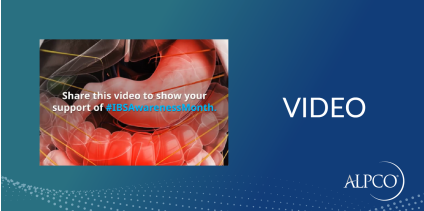April 11, 2018
IBS Awareness Month: Facts About IBS
In support of IBS Awareness Month, we created this short video to share some important facts about IBS and spread the word about this incurable, debilitating disorder.
Be sure to like and share our video to show your support of IBS Awareness Month!
https://youtu.be/6K_55Bg922s
Quick Facts About IBS
- IBS was described as early as 1849 by Dr. Cumming in the London Medical Gazette.1
- An estimated 9-23% of the global population has IBS.2 In the US, 25-45 million are estimated to suffer from IBS.3
- Symptoms of IBS greatly vary, but include cramping, abdominal pain, bloating, gas, diarrhea, constipation, mucous in stool, and changes in bowel habits4. These symptoms greatly reduce the quality of life for those with IBS.5
- Those with IBS report having a lower quality of life. Studies demonstrate that individuals with IBS are more likely to have anxiety and depression.2
- IBS is a functional gastrointestinal disorder, meaning it doesn’t cause changes to bowel tissue4 so there are no signs of visible damage to the digestive tract6. Therefore, diagnosis the disorder can be difficult.2,5,7
- Diagnosing IBS usually occurs after other GI diseases like inflammatory bowel disease, thyroid dysfunction, and celiac disease have been ruled out.7
- Research shows that women are twice more likely to have IBS than men.4
- IBS is more likely to occur in people under 50 years of age.5,8
- Unfortunately, there is no cure for IBS. 2
- Although IBS has been studied for over 150 years, the exact cause of the disorder is unknown.1,2
- Research indicates that there are many factors that may contribute to IBS such as parasitic, protozoan, or bacterial infections, as well as genetics, diet, and stress.2,5
- More recently researchers are interested in understanding how miscommunication within the gut-brain axis, alterations in the gut microbiota composition, and bile acid malabsorption are connected to IBS.2,7
- Existing therapies target single symptoms of IBS, but do not address all of the major issues.2
- Both pharmacologic and nonpharmacologic management strategies for IBS are currently being researched in an effort to improve care.5
- These strategies include dietary intervention, controlling the gut microbiota population with both probiotics and antibiotics, serotonin report antagonists, and the use of peppermint oil.2,5,7
References
- Cumming. (1849). Electrogalvinism in a particular affliction of mucous membrane of the bowels. London Med Gaz. 1849;59:969-73.
- Saha. (2014). Irritable bowel syndrome: Pathogenesis, diagnosis, treatment, and evidence-based medicine. World J Gastroenterol. 2014 Jun 14;20(22):6759–6773. PMCID: PMC4051916.
- International Foundation for Functional Gastrointestinal Disorders. (2016). Facts about IBS. IFFGD. aboutibs,org.
- Mayo Clinic. (2018). Irritable bowel syndrome. Mayo Clinic. mayoclinic.org.
- Weaver et al. (2017). Irritable Bowel Syndrome: And evidence-based review of new diagnostic criteria and treatment recommendations. AJN. 2017 June;117(6): 48–55. doi: 10.1097/01.NAJ.0000520253.57459.01.
- NIDDK. (2017). Irritable Bowel Syndrome. NIH. niddk.nih.gov.
- Schoenfeld. (2016). Advances in IBS 2016: A Review of Current and Emerging Data. Gastroenterol Hepatol (N Y). 2016 Aug;12(8 Suppl 3):1–11. PMCID: PMC5210026.
- Lovell & Ford. (2012). Global prevalence of and risk factors for irritable bowel syndrome: a meta-analysis. Clin Gastroenterol Hepatol. 2012;10(7):712-21 e4.

